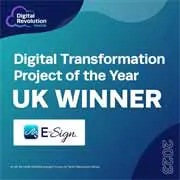Home | News & Insights |
How Electronic Signatures Can Speed up Property Transactions
Laura Cain
Marketing & Brand Manager
PUBLISHED
18th July, 2022
Property transactions can be long and complicated. If you’ve ever rented or bought a property, you’ll know first-hand just how much paperwork you need to fill in. Likewise, if you work in the real estate business, you’ll also know the amount of paperwork that goes on behind the scenes. It’s a time-consuming process. But what if you could take the paper out of paperwork?
With conveyancer-certified electronic signatures, you can keep your property documents digital and help to speed up the process of filling in paperwork, not just for you but also for your clients. In this blog, we’ll be looking at how e-signatures can speed up your property transaction, as well as the types of documents that you can sign with an e-signature.
What is an Electronic Signature?
An electronic signature is a secure and legally binding way to sign documents without pen and paper. Just like traditional ‘wet’ signatures, e-signatures indicate the signer’s intent to agree to the content of the documents. There are three types of electronic signatures:
- Simple Electronic Signatures
- Advanced Electronic Signatures
- Qualified Electronic Signatures
Both advanced and qualified e-signatures are considered to be the most secure option for signing, as they provide extra assurance about the authenticity of documents and the identity of the signers.
E-signatures have been legally valid since 2000 with the Electronic Communications Act and are accommodated by the EU eIDAS. In 2019, the Law Commission further confirmed that electronic signatures were a valid way to sign documents.
Does the HM Land Registry Accept E-Signatures?
The HM Land Registry now accepts electronic signatures. Before 2020, you could only sign things like deed transfers with traditional, wet signatures. During COVID-19, however, the HM Land Registry changed its stance and began to accept electronically signed documents, as outlined in Practice Guide 82.
The ability to use e-signatures makes signing property documents more convenient and flexible. You’ll still need to witness certain documents such as the transfer of property ownership, just as you would if you were using pen and paper. However, the witness can also electronically sign the document as well.
E-Signature versus Mercury Signing
In 2019, the Law Commission endorsed an approach to ‘Execute documents by virtual means” when all parties could not be present for deed signing. Known as Mercury signing, this approach allows conveyancers to sign documents without in-person meetings. Unlike electronic signatures, the parties will need to print, wet sign and then scan the document to make a digital copy. The scans will be added to the final deed.
Conversely, electronic signatures eliminate the need to print and scan documents; you can keep the document digital and simply add your e-signature. It’s clear that the process is far more streamlined with electronic signatures and helps to simplify paperwork in what can be a complicated and long-winded processes.
What Property Documents Can Be Signed With an Electronic Signature
Electronic signatures are incredibly versatile. You can use them on any document that you’d otherwise sign by hand. When it comes to conveyance and real estate documents, electronic signatures can be used on:
- Landlord contracts
- Tenancy agreements
- Terms of business
- Inventories
- Terms of business
- Inventories
- Transfer of ownership
- Mortgages
For documents that require witnessing, you will still need to have your electronic signature witnessed to ensure it complies with HM Land Registry and that it’s legally valid. This includes documents such as mortgages and transfer of ownership.
How Can Electronic Signatures Speed up Property Transactions?
Take the Paper Out of Paperwork
Electronic signatures enable you to keep your documents digital, allowing you to eliminate the paper from your ‘paperwork’. Digital documents help to streamline your document processes and make managing paperwork easier. There’s no need to print, scan or file: in just a few clicks you can create, e-sign, and email your property documents. This not only reduces document creation time but also saves you time on administration, helping to speed up your property transactions.
Fill in Documents Quicker
Obtaining a handwritten signature can be a long and drawn-out process, which ends up slowing down your property transactions. You either need to arrange in-person meetings, send documents via the post or send a scan via email. With electronic signatures, signing and returning documents becomes much easier. In just a few clicks, documents can be viewed, signed and returned, allowing all parties to process documents more efficiently and quickly.
Manage Documents Remotely
The HM Land Registry restrictions on electronically signed documents became a particular problem during the pandemic. In-person meetings were limited so signing and witnessing property documents became difficult. Electronic signatures provide a secure and efficient way to exchange and sign documents remotely, which not only offers more flexibility for clients but also enables you to promote remote working across your business without damaging communication and collaboration.
Add Simple Security Measures
The security of your documents and transactions will no doubt be a number one priority for both you and your clients. Digital documents and e-signatures can help you speed up your property transactions, without sacrificing security and in some cases making your transactions more secure than if you used paper. Electronic signatures themselves are secure and digital documents can also be password and PIN protected.
Reduce Document Turnaround Time
Property documents take time to process. Part of this is due to the number of different signers and parties that can be involved in processing property transactions, such as the clients, the landlord/seller and conveyancers. Electronic signatures enable all parties to sign and return documents much quicker than paperwork. This helps to minimise delays throughout the process, reducing the time your documents are with each party and helping to speed up your property transactions.
How Can E-Sign Support Renters, Buyers, Conveyancers and Agencies
If you’re looking for a secure and user-friendly qualified signature, you can count on E-Sign to support your property transactions. Here are some of the top reasons you should choose E-Sign as your electronic signature.
Conveyancer Certified Signature
Our e-signatures are secure and easy to use; all you have to do is type out your name in our electronic signature field. This will record the date and time of the signature, as well as the IP address. Our signatures are also supported by a digital certificate, so you can confirm your transactions are authentic.
Editable Documents
Make filling in paperwork easy with our editable digital documents. With E-Sign, you can make your documents editable by adding text boxes, tick boxes, drop-down selections and of course our e-signature field.
Verification Tools
We understand that protecting the contents of your document is important to your business and client data. Our verification tools ensure that only intended parties can view and e-sign your document. Enable password protection and SMS authentication to protect your property documents.
Compliant With HM Land Registry
E-Sign is fully compliant with HM land registry requirements, as outlined by Practice Guide 82. Sign documents confident in the knowledge that they are legally valid and fully compliant with the HM Land Registry guidelines.
Try E-Sign Today for Free
If you’re looking to make processing property transactions simpler, try out E-Sign today. With our 14-day free trial, you can discover the power of E-Sign for yourself. There’s no download or payment information required. All you’ll need is your email address.
E-Sign is a leading provider of digital transaction management solutions, supplying professional services including Electronic Signatures, Web Forms, ID Checker, Verification Tools, Personalised Emails, API and Payment Processing to businesses of all sizes across the UK.
To find out more about our E-Sign solutions and how they could transform your business, get in touch with us today.
 Facebook
Facebook
 X (Twitter)
X (Twitter)
 LinkedIn
LinkedIn











